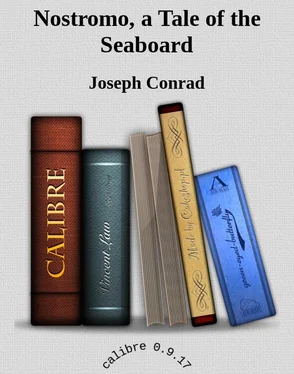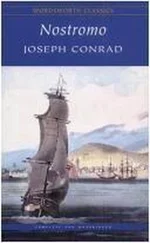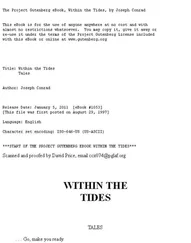Joseph Conrad - Nostromo, a Tale of the Seaboard
Здесь есть возможность читать онлайн «Joseph Conrad - Nostromo, a Tale of the Seaboard» весь текст электронной книги совершенно бесплатно (целиком полную версию без сокращений). В некоторых случаях можно слушать аудио, скачать через торрент в формате fb2 и присутствует краткое содержание. Жанр: Старинная литература, на английском языке. Описание произведения, (предисловие) а так же отзывы посетителей доступны на портале библиотеки ЛибКат.
- Название:Nostromo, a Tale of the Seaboard
- Автор:
- Жанр:
- Год:неизвестен
- ISBN:нет данных
- Рейтинг книги:4 / 5. Голосов: 1
-
Избранное:Добавить в избранное
- Отзывы:
-
Ваша оценка:
- 80
- 1
- 2
- 3
- 4
- 5
Nostromo, a Tale of the Seaboard: краткое содержание, описание и аннотация
Предлагаем к чтению аннотацию, описание, краткое содержание или предисловие (зависит от того, что написал сам автор книги «Nostromo, a Tale of the Seaboard»). Если вы не нашли необходимую информацию о книге — напишите в комментариях, мы постараемся отыскать её.
Nostromo, a Tale of the Seaboard — читать онлайн бесплатно полную книгу (весь текст) целиком
Ниже представлен текст книги, разбитый по страницам. Система сохранения места последней прочитанной страницы, позволяет с удобством читать онлайн бесплатно книгу «Nostromo, a Tale of the Seaboard», без необходимости каждый раз заново искать на чём Вы остановились. Поставьте закладку, и сможете в любой момент перейти на страницу, на которой закончили чтение.
Интервал:
Закладка:
"Do you hear what he says?" Charles Gould said in English to Antonia.
"Forgive us our misery!" she exclaimed, hurriedly. "It is your character that is the inexhaustible treasure which may save us all yet; your character, Carlos, not your wealth. I entreat you to give this man your word that you will accept any arrangement my uncle may make with their chief. One word. He will want no more."
On the site of the roadside hut there remained nothing but an enormous heap of embers, throwing afar a darkening red glow, in which Antonia's face appeared deeply flushed with excitement. Charles Gould, with only a short hesitation, pronounced the required pledge. He was like a man who had ventured on a precipitous path with no room to turn, where the only chance of safety is to press forward. At that moment he understood it thoroughly as he looked down at Don Jose stretched out, hardly breathing, by the side of the erect Antonia, vanquished in a lifelong struggle with the powers of moral darkness, whose stagnant depths breed monstrous crimes and monstrous illusions. In a few words the emissary from Hernandez expressed his complete satisfaction. Stoically Antonia lowered her veil, resisting the longing to inquire about Decoud's escape. But Ignacio leered morosely over his shoulder.
"Take a good look at the mules, mi amo," he grumbled. "You shall never see them again!"
CHAPTER FOUR
Charles Gould turned towards the town. Before him the jagged peaks of the Sierra came out all black in the clear dawn. Here and there a muffled lepero whisked round the corner of a grass-grown street before the ringing hoofs of his horse. Dogs barked behind the walls of the gardens; and with the colourless light the chill of the snows seemed to fall from the mountains upon the disjointed pavements and the shuttered houses with broken cornices and the plaster peeling in patches between the flat pilasters of the fronts. The daybreak struggled with the gloom under the arcades on the Plaza, with no signs of country people disposing their goods for the day's market, piles of fruit, bundles of vegetables ornamented with flowers, on low benches under enormous mat umbrellas; with no cheery early morning bustle of villagers, women, children, and loaded donkeys. Only a few scattered knots of revolutionists stood in the vast space, all looking one way from under their slouched hats for some sign of news from Rincon. The largest of those groups turned about like one man as Charles Gould passed, and shouted, "Viva la libertad!" after him in a menacing tone.
Charles Gould rode on, and turned into the archway of his house. In the patio littered with straw, a practicante, one of Dr. Monygham's native assistants, sat on the ground with his back against the rim of the fountain, fingering a guitar discreetly, while two girls of the lower class, standing up before him, shuffled their feet a little and waved their arms, humming a popular dance tune.
Most of the wounded during the two days of rioting had been taken away already by their friends and relations, but several figures could be seen sitting up balancing their bandaged heads in time to the music. Charles Gould dismounted. A sleepy mozo coming out of the bakery door took hold of the horse's bridle; the practicante endeavoured to conceal his guitar hastily; the girls, unabashed, stepped back smiling; and Charles Gould, on his way to the staircase, glanced into a dark corner of the patio at another group, a mortally wounded Cargador with a woman kneeling by his side; she mumbled prayers rapidly, trying at the same time to force a piece of orange between the stiffening lips of the dying man.
The cruel futility of things stood unveiled in the levity and sufferings of that incorrigible people; the cruel futility of lives and of deaths thrown away in the vain endeavour to attain an enduring solution of the problem. Unlike Decoud, Charles Gould could not play lightly a part in a tragic farce. It was tragic enough for him in all conscience, but he could see no farcical element. He suffered too much under a conviction of irremediable folly. He was too severely practical and too idealistic to look upon its terrible humours with amusement, as Martin Decoud, the imaginative materialist, was able to do in the dry light of his scepticism. To him, as to all of us, the compromises with his conscience appeared uglier than ever in the light of failure. His taciturnity, assumed with a purpose, had prevented him from tampering openly with his thoughts; but the Gould Concession had insidiously corrupted his judgment. He might have known, he said to himself, leaning over the balustrade of the corredor, that Ribierism could never come to anything. The mine had corrupted his judgment by making him sick of bribing and intriguing merely to have his work left alone from day to day. Like his father, he did not like to be robbed. It exasperated him. He had persuaded himself that, apart from higher considerations, the backing up of Don Jose's hopes of reform was good business. He had gone forth into the senseless fray as his poor uncle, whose sword hung on the wall of his study, had gone forth—in the defence of the commonest decencies of organized society. Only his weapon was the wealth of the mine, more far-reaching and subtle than an honest blade of steel fitted into a simple brass guard.
More dangerous to the wielder, too, this weapon of wealth, double-edged with the cupidity and misery of mankind, steeped in all the vices of self-indulgence as in a concoction of poisonous roots, tainting the very cause for which it is drawn, always ready to turn awkwardly in the hand. There was nothing for it now but to go on using it. But he promised himself to see it shattered into small bits before he let it be wrenched from his grasp.
After all, with his English parentage and English upbringing, he perceived that he was an adventurer in Costaguana, the descendant of adventurers enlisted in a foreign legion, of men who had sought fortune in a revolutionary war, who had planned revolutions, who had believed in revolutions. For all the uprightness of his character, he had something of an adventurer's easy morality which takes count of personal risk in the ethical appraising of his action. He was prepared, if need be, to blow up the whole San Tome mountain sky high out of the territory of the Republic. This resolution expressed the tenacity of his character, the remorse of that subtle conjugal infidelity through which his wife was no longer the sole mistress of his thoughts, something of his father's imaginative weakness, and something, too, of the spirit of a buccaneer throwing a lighted match into the magazine rather than surrender his ship.
Down below in the patio the wounded Cargador had breathed his last. The woman cried out once, and her cry, unexpected and shrill, made all the wounded sit up. The practicante scrambled to his feet, and, guitar in hand, gazed steadily in her direction with elevated eyebrows. The two girls—sitting now one on each side of their wounded relative, with their knees drawn up and long cigars between their lips—nodded at each other significantly.
Charles Gould, looking down over the balustrade, saw three men dressed ceremoniously in black frock-coats with white shirts, and wearing European round hats, enter the patio from the street. One of them, head and shoulders taller than the two others, advanced with marked gravity, leading the way. This was Don Juste Lopez, accompanied by two of his friends, members of Assembly, coming to call upon the Administrador of the San Tome mine at this early hour. They saw him, too, waved their hands to him urgently, walking up the stairs as if in procession.
Don Juste, astonishingly changed by having shaved off altogether his damaged beard, had lost with it nine-tenths of his outward dignity. Even at that time of serious pre-occupation Charles Gould could not help noting the revealed ineptitude in the aspect of the man. His companions looked crestfallen and sleepy. One kept on passing the tip of his tongue over his parched lips; the other's eyes strayed dully over the tiled floor of the corredor, while Don Juste, standing a little in advance, harangued the Senor Administrador of the San Tome mine. It was his firm opinion that forms had to be observed. A new governor is always visited by deputations from the Cabildo, which is the Municipal Council, from the Consulado, the commercial Board, and it was proper that the Provincial Assembly should send a deputation, too, if only to assert the existence of parliamentary institutions. Don Juste proposed that Don Carlos Gould, as the most prominent citizen of the province, should join the Assembly's deputation. His position was exceptional, his personality known through the length and breadth of the whole Republic. Official courtesies must not be neglected, if they are gone through with a bleeding heart. The acceptance of accomplished facts may save yet the precious vestiges of parliamentary institutions. Don Juste's eyes glowed dully; he believed in parliamentary institutions—and the convinced drone of his voice lost itself in the stillness of the house like the deep buzzing of some ponderous insect.
Читать дальшеИнтервал:
Закладка:
Похожие книги на «Nostromo, a Tale of the Seaboard»
Представляем Вашему вниманию похожие книги на «Nostromo, a Tale of the Seaboard» списком для выбора. Мы отобрали схожую по названию и смыслу литературу в надежде предоставить читателям больше вариантов отыскать новые, интересные, ещё непрочитанные произведения.
Обсуждение, отзывы о книге «Nostromo, a Tale of the Seaboard» и просто собственные мнения читателей. Оставьте ваши комментарии, напишите, что Вы думаете о произведении, его смысле или главных героях. Укажите что конкретно понравилось, а что нет, и почему Вы так считаете.












